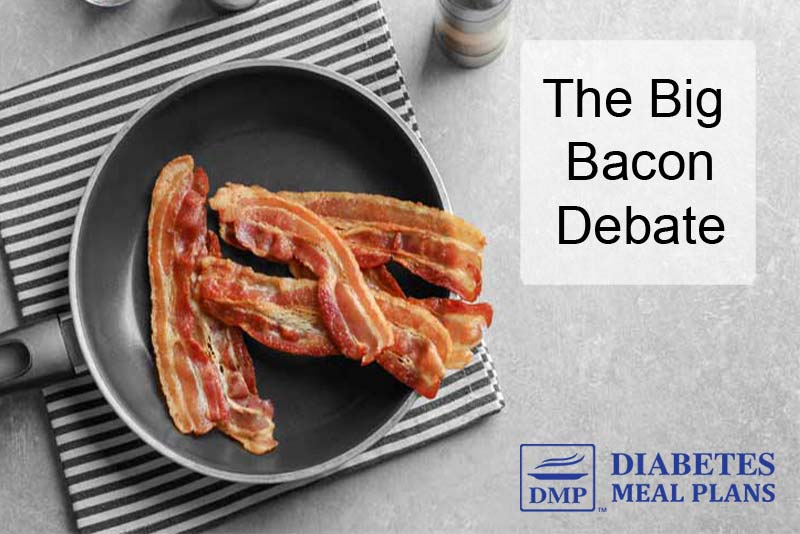Bacon is obviously a well-loved food and in low carb circles it is eaten for breakfast, lunch and dinner on a regular basis.
If you’re wondering, can diabetics eat bacon? The short answer is yes. The longer answer is it’s best to keep a limit on how often you eat it.
Let’s look a little closer.
Bacon Nutrition Facts
Macronutrients
1 rasher of middle bacon contains roughly:
- Kilojoules/Calories: 515/123
- Carbohydrates: <1g
- Protein: 9.6g
- Fat: 9.2g
- Fibre: 0g

*Nutrition facts can vary dependent on brand.
Bacon is clearly a low carb food that is largely made up of protein and fat. This is a good combination for blood sugar regulation, but there are still other aspects of nutrition to consider.
Micronutrients and Bacon
Pork bacon does contain micronutrients like vitamin B12, B6, B3, selenium, zinc, phosphorus, and iron.
These vitamins and minerals are vital for energy production, hormone regulation, and nervous system health in the body. However, they are available on other foods as well, for instance, unprocessed meats.
Research Facts on Bacon and Type 2 Diabetes
- Research has shown a significant association between the consumption of meat, particularly processed meat, and the development of type 2 diabetes.
- Studies have found that the intake of unprocessed red meat was not associated with an increased risk for either diabetes or coronary heart disease. Whereas the intake of processed red meat was associated with a 42% increased risk of coronary heart disease and a 19% increased risk of developing diabetes.
- It is also fairly widely accepted that processed meat is associated with both heart disease and colon cancer.
These studies aren’t randomised controlled trials so they can’t show cause and effect, but the general consensus is that processed meats are far less healthy than natural unprocessed meats.
Best Type of Bacon to Eat
There isn’t really a “best” bacon to buy. Most bacon is processed and contains a combination of salt, mineral salts, added sugar, preservatives, antioxidants, and perhaps other flavourings and ingredients.
Are meatless (vegetarian) versions of bacon healthier?
Imitation meats are about as far from a “whole food” as you can get, as they contain a combination of vegetarian protein, thickeners, oils, sugars, flavourings and preservatives.
While having vegetarian substitutes is a good goal for personal and environmental reasons, studies have noted the lack of nutrients in vegetarian meats and the high levels of sodium in particular. In most cases, it would be best to consume unprocessed forms of vegetarian protein sources.
Recommendation on Bacon for Type 2 Diabetes
Can diabetics eat bacon?
Yes. Bacon is a protein and fat-based food so won’t have too much impact on blood sugar levels. However, enjoy your bacon in moderation, occasionally.
Keep in mind that bacon is a processed meat. For the most part, non-processed meats, poultry, and fish should make up the predominant proteins in your eating plan, along with eggs, dairy products, and some nuts and seeds.
The occasional bacon breakfast or the addition of bacon to a meal here and there, can add to the flavour and enjoyability of your diabetes-friendly diet overall. So enjoy it, just don’t go overboard!

